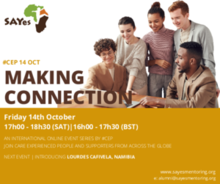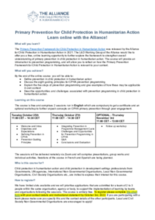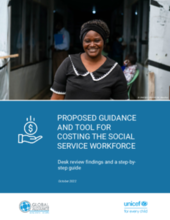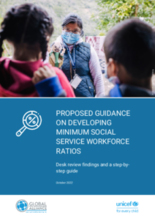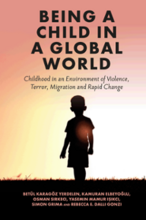Displaying 631 - 640 of 4400
The purpose of this event series is to bring care-experienced people and supporters from all over the world together to connect, expand and create new ideas for change.
Join Family for Every Child's second in their series of three webinars focusing on mental health. Four Family for Every Child member organisations will share their experiences and perspectives, building on discussions from their last webinar.
Research in Practice and CoramBAAF are working together to host an open access online event about the recommendations of the Independent Review of Children’s Social Care for kinship care and how to support practitioners unlock the potential of family networks. The event will cover current issues relating to kinship care, the recommendations relating to kinship care that are in the Independent Review of Children’s Social Care, practical ways to involve family networks, recent research and ways practitioners can improve practice and experience of kinship carers right now.
The L&D Working Group of the Alliance would like to offer you a free, online learning opportunity to further explore the framework to strengthen overall understanding of primary prevention in child protection in humanitarian action. The course will provide an introduction to prevention programming, and will allow you to reflect on how the Primary Prevention Framework for Child Protection in Humanitarian Action is relevant to your context.
The purpose of this guidance is to advise policy makers and planners on how to apply a set of variables to their specific context to enable them to calculate the costs of human resources required to meet a target minimum ratio of social service workers per population, in the country in question. The guidance first discusses the essential steps that need to be taken to prepare for a costing exercise, and then the specific steps to take in a costing exercise for the workforce, which are outlined in the costing tool itself (to be released at a later date).
This guide is intended to inform policy makers and workforce managers in ministries of social welfare, finance and planning, and, where applicable, provincial or district authorities and other relevant national bodies responsible for the recruitment, deployment, funding or regulation of the social service workforce. The guide can also be used by a national level leadership group tasked with defining an adequate level of resourcing for social services, and, on this basis, a minimum ratio of workforce to population, alongside other steps to strengthen the social service workforce.
The Special Representative of the Secretary General on Violence Against Children will present for the first time ever her General Assembly Report to Children.
UNCEF's newest Goodwill Ambassador, 25-year-old Ugandan activist Vanessa Nakate, has been calling for urgent action to mitigate climate change since 2019, when she organized a protest with her siblings and cousins on the streets of Kampala. Inspired by Greta Thunberg, Nakate continued to protest weekly, becoming a well-known face in the movement of young people striking for climate action around the world.
This study aims to provide an overview of the world's children who lack parental care in the light of the theoretical background and the latest research.
The Adolescent Data Portal features global, regional and country-level data on key indicators together with information on the socio-economic contexts in which adolescents live are found here. The portal includes globally comparable indicators, closely linked to the Sustainable Development Goals (SDGs).

